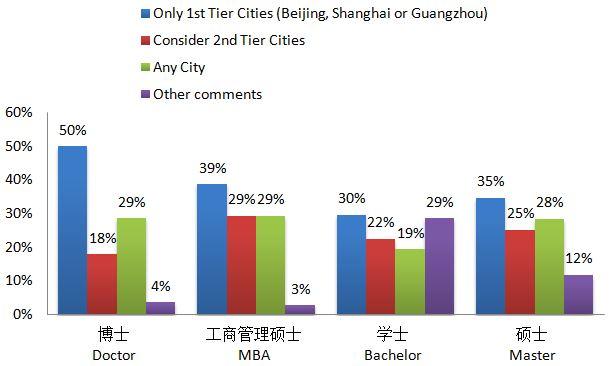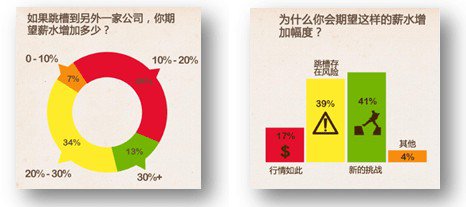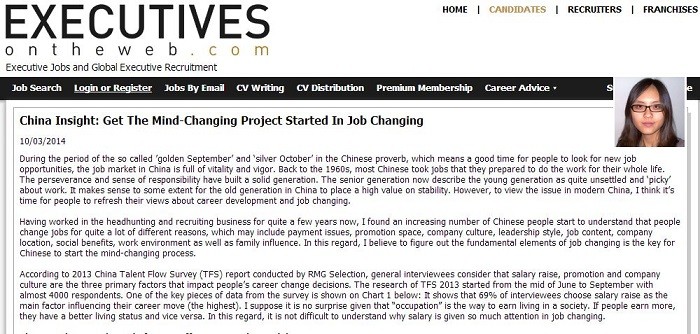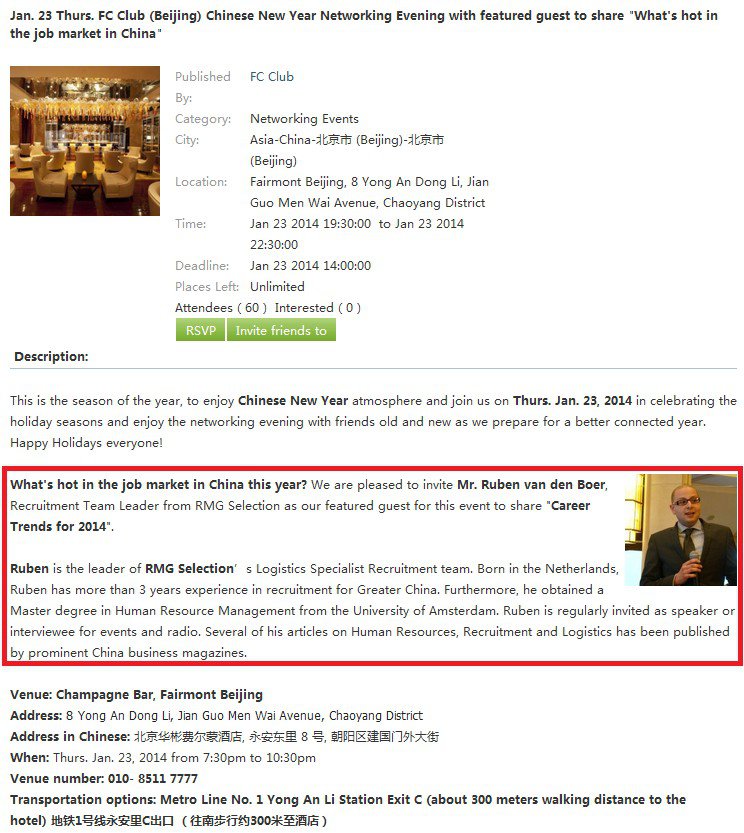
In recently years, the heated topics like “escape from Beijing, Shanghai and Guangzhou”, “second and third tier cities turn into new work stage”, and “escape to Beijing, Shanghai and Guangzhou” etc. become heated discussion. For quite a long time lots of people follow others like sheep running away from big cities. However, soon they find out that they are wrong. Crowds of migrant workers come back to Beijing, Shanghai and Guangzhou. According to the latest survey, nowadays people choose the location they for their career development more rationally and reasonably than before. They think about the location based on the city environment and self-development space. China Talents-Flow Survey 2013 (TFS 2013) conducted by RMG Selection just release in November. Nearly 4000 people responded to this report about the talent trend and talent flow in China. The result shows that how different types of talent consider work location, which actually provides references for companies who want to seek for and retain excellent people in different cities.
According to TFS 2013, though 35% elites choose to stay in first tier cities (Beijing, Shanghai and Guangzhou), the proportions of people choose tier 2 and tier 3 cities increase quite significantly. The data show that 53% respondents consider relocating in second and third tier cities. Some even would like to move further to fourth tier cities. I have to say the result is closely related to the economic development. In particular, the percentage of people who consider moving to second tier cities increased 16% compare to the data in TFS 2012-2013. In this regard, employers who made investment in second tier cities might usher “talent reward” now. By analyzing the data in terms of gender, age and education background, I have found some interesting rules. I suppose employers can adjust targets and strategies by learning these rules. In this way, they can recruit comparatively “cost effective” employees.

Let’s take a look from the angel of male and female. The percentage of female who choose to stay in first tier cities is 10% higher than the number of male. On the one hand, women have higher standards toward comfortable life than men. Industries in first tier cities are low in physical demands, job hazard and contamination, which obviously better fit the needs of female. Working in first tier cities also ensures the fairness in competition between male and female. However, it can be seen that the percentage of male who choose to work in any city is 32%. Comparatively, either from the viewpoint of physiology or psychology, men is stronger than women in the three aspects. On the other hand, Chinese hasn’t defined the role to female as full time “hired guns”. Traditional Chinese require women taking care of children and senior family members better than men, which to a large extent, limits the possibility of developing their career in desired cities. However, the sharp rising of second tier cities and the fast mind-changing make Chinese women capable, intelligent and skilled, which allow them to compete fairly with Chinese men.

Career development varies in different age groups. Therefore, the choice toward working location varies in different age groups. The willingness of going to first tier cities is inversely proportional to age. To be specific, the younger they are, the longer they would like to strive for life in big cities. Although the housing prices in big cities increase sharply, fresh graduates do not seem to care the living standards. Some of them do not even mind lower traffic, food, or clothing standards. These young graduates prefer to work hard and bear more pressure for a bright future. With the increase of age, expenses on marriage, medical care and education increase gradually. The high cost of living in first tier cities becomes very obvious. This is also the reason why some people at their age of 30 want to go to other cities. The age group from 18 to 35 has a relatively weak wish to move to other cities. People’s move shows up after they are 45 years old. Part of the reason is that people who are over 45 are less affected by family members. They can choose to move based on their career and preference. Additionally, some job opportunities are only available for people over 45. To get more choices, people will make concessions on location. However, employers need to bear it in mind that people who are over 45 still get 10 years time of golden career. Their experience is relatively mature. Actually, they might be good choices for employers.

It can be seen in TFS 2013 that the higher education background people have the higher proportion of staying in first tier cities it is. The lower education background people have the higher proportion of going to any city. There are 50% of people with doctor degree choose to stay in first tier city, which is 20% higher than bachelor degree respondents. One third of respondents with bachelor degree don’t mind to move to any city. However, the choice only accounts for 30%-40% among doctor degree and MBA people. In this regard, it can be seen that first tier city is very attractive to people with high education background. However, high education background does not equal to strong ability or high productivity. Therefore, employers in other cities should not hold the grudge.

Retain talent vs. Attract talent
In general, we can clearly see the attractiveness for different people in different regions. On the one hand, there are crowds of fresh workforce in first tier cities, which means employers can choose excellent people in these cities. On the other hand, big cities attract a lot more high-end people, so employers have variety of choices. What worth noticing is that if you want to make talent stabilized and attract potential talent, you need to pay attention to cost of living in the city and working environment. In this regard, we have two solutions. First, hiring with quality payment. Some companies actually already started to increase salary and benefits. For example, in 2014 Huawei will increase the base salary level of fresh graduates. Salary before tax of a first tier city graduated student will be increased from 6500 Yuan to over 9000 Yuan. The salary level of master degree people will be increased from 8000 Yuan to more than 10,000 Yuan before tax. Second, improve working environment. Companies should prepare air purifiers especially when the buildings don’t have such machines. Additionally, healthcare check and healthcare products should be prepared, which will exert positive effects on retaining talent.
Employers in tier 2 and 3 cities actually are prioritized in choosing talent aged between 30 to 35 years old. In particular, people with rich experience and hard working. It’s a good opportunity to attract those people to second tier cities. People who aged between 45 to 55 years old already have good connections and resource accumulation. In this regard, if employers hire this type, they will certainly get lots of benefits. About people with high education background, male is easier and more stable choice. So helping them with relocation is very effective as well.
Regardless of big cities or small cities, people should carefully choose where they want to work. Both first tier cities and other cities have advantages and disadvantages in economic development, living environment and job opportunity. Only if people can find the most suitable one can they work and live happily ever after. As for government and company, they should focus on providing more development opportunities, improving better work environment and life for employees. Despite of running away from Beijing, Shanghai and Guangzhou or keeping staying there, it helps with the talent flow among cities. Talent flow is good for equal competition and development as well as the talent resource distribution.
By Robert Parkinson, CEO & Founder of RMG Selection
Article published on Business Tianjin
 求职者们跳槽的原因总是随着时间的推进有所变化。从早期人们跳槽只向“钱”看齐,到后来人们对公司文化和直线经理管理风格等软性因素的关注,这前后的变化让HR经理人们开始思考保留员工以及吸引新鲜血液的法宝到底是什么。根据罗迈国际2013年《中国人才流动调查报告》(TSF2),针对69%的调查参与者,跳槽时首当其冲的原因便是涨薪。因此,罗迈国际在2014年的一些列市场调研中针对涨薪进行了深入调查。
1、如果跳槽到另外一家公司,你期待薪水增长多少?
根据涨薪调研结果显示,2014年53%的调查参与者对于跳槽之后涨薪的期待范围在0%-20%。与2013年的情况相比,20%的跳槽薪水增长对于当时八成调查参与者来说仅是个起点而已。34%的求职者期待20%-30%的涨薪幅度,这个数据与去年相比基本持平。关于期待涨薪超过30%的求职者,从去年的43%垂直下降到了13%。不难看出今年求职者们在跳槽时对薪水的期待趋于谨慎。
然而根据中国之声《央广新闻》在2014年2月21日报道的企业涨薪数据来看,情况并不乐观。新闻中提到2014年58%的涨薪幅度在6%-10%,仅有9%的企业能达到10%以上的涨薪。同时,根据不同行业,涨薪幅度差异很大。比如,新型高科技,移动医疗,电子商务,以及传统垄断行业的加薪幅度都会相对较大。求职者们跳槽都希望谋得良好的薪资福利待遇,然而企业(尤其对于中小企业)则要考虑吸收人才和运营成本之间的平衡。
涨多少薪水合适——图一图二
求职者们跳槽的原因总是随着时间的推进有所变化。从早期人们跳槽只向“钱”看齐,到后来人们对公司文化和直线经理管理风格等软性因素的关注,这前后的变化让HR经理人们开始思考保留员工以及吸引新鲜血液的法宝到底是什么。根据罗迈国际2013年《中国人才流动调查报告》(TSF2),针对69%的调查参与者,跳槽时首当其冲的原因便是涨薪。因此,罗迈国际在2014年的一些列市场调研中针对涨薪进行了深入调查。
1、如果跳槽到另外一家公司,你期待薪水增长多少?
根据涨薪调研结果显示,2014年53%的调查参与者对于跳槽之后涨薪的期待范围在0%-20%。与2013年的情况相比,20%的跳槽薪水增长对于当时八成调查参与者来说仅是个起点而已。34%的求职者期待20%-30%的涨薪幅度,这个数据与去年相比基本持平。关于期待涨薪超过30%的求职者,从去年的43%垂直下降到了13%。不难看出今年求职者们在跳槽时对薪水的期待趋于谨慎。
然而根据中国之声《央广新闻》在2014年2月21日报道的企业涨薪数据来看,情况并不乐观。新闻中提到2014年58%的涨薪幅度在6%-10%,仅有9%的企业能达到10%以上的涨薪。同时,根据不同行业,涨薪幅度差异很大。比如,新型高科技,移动医疗,电子商务,以及传统垄断行业的加薪幅度都会相对较大。求职者们跳槽都希望谋得良好的薪资福利待遇,然而企业(尤其对于中小企业)则要考虑吸收人才和运营成本之间的平衡。
涨多少薪水合适——图一图二
 2、为什么你会期望这样的薪水增加幅度?
这是一个看似没有必要问的问题,仿佛跳槽涨薪是理所当然啊!但调查起来发现人才的想法确实各有不同,并且,在了解涨薪期待原因的基础上,雇主才能更好地决策薪酬涨幅。罗迈国际RMG的调查结果显示,41%的调查参与者认为新工作中的挑战是值得自己提出加薪期待值的重要原因。另外,39%的求职者提出跳槽是找寻机遇,同时也要承担相应的风险,毕竟是从一个自己十分熟悉的环境进入一个完全陌生的公司,为了降低个人承担的风险,新公司在涨薪上给予对方安全感可以更好地吸引新人才。仅有不到二成的求职者会根据所谓的“涨薪常识”,随意提出涨薪要求。罗迈求职顾问建议求职者切勿随意提涨薪,否则失去新工作机会的几率会大幅增加,也是对自己职业发展的不负责。在提出期待值之前,一定要首先明确个人能为新公司带来的价值。
3、很多雇主认为,涨薪不仅无法激励员工更努力地工作,一旦造成员工福利补贴不公平,还会对员工产生负面影响。对于这个观点,你同意吗?
这个问题事实上是非常多的管理层及人力资源部门工作者会关心的问题,尤其是很多直线经理,或多或少会有类似的担心。罗迈国际针对这种普遍情况在调查中提出了该问题,其结果显示担心并非无由之谈,有26%的求职者对该问题持肯定观点,35%则持反对观点,更多的人选择了不确定的选项。可见对于业绩考核优秀的员工,涨薪无疑是激励他们更加努力工作的最好措施。甚至,他们的升职加薪会为其他员工树立榜样,让其他没有加薪的人找到奋斗目标。
然而,很多企业中加薪的事实情况是同时间区间内业绩优异的员工有若干个,但是由于企业运营成本问题,获得加薪机会的员工可能仅占20%。剩余优秀员工中那80%的员工就属于35%的范畴了。同样的业绩表现,不同的待遇会让这些员工感到企业的不公平待遇。此时,他们的离职意愿会比以往更强。因此,我们建议企业在激励优秀员工的同时,切勿忽略其他员工的感受,而对这种感受的关切更应体现在平时,在适当的时机增加公开表扬或者一些物质奖励不失为有效的平衡与管理措施。
涨多少薪水合适——图三图四
4、你是否认为白领对跳槽加薪的要求太过分了?(期望过高)
之所以在本期调查中提出这个问题,是因为我们旨在了解求职者们是否清楚当今跳槽加薪要求的合理性。而对于调查结果,我们并不感到意外。虽然求职者们一直强调跳槽时最看重薪水增长幅度,然而56%的求职者对于自己的跳槽加薪要求都充满了不确定性,甚至17%的调查参与者同意“白领队跳槽加薪的要求太过分了”。这一调查结果也呼应了第一题中求职者们跳槽加薪趋于谨慎的调查结果,以及《央广新闻》中提到的2014年企业加薪情况。其次,各个行业非公开非透明的跳槽涨薪“规则”也是导致求职者们不确定加薪合理与否的原因之一。综合来看,涨多少合适,是一个由市场、雇主、应聘者三方相互作用的结果,任何一方提出过于不合理的需求都将打破平衡。可以肯定的是,合理的涨薪无论对于内部还是新招聘,都是有利于企业人才发展的,而一些“待价而沽”的应聘者们,也应随时调整心态,争取更有优势的职业发展才是要务。
原文链接
2、为什么你会期望这样的薪水增加幅度?
这是一个看似没有必要问的问题,仿佛跳槽涨薪是理所当然啊!但调查起来发现人才的想法确实各有不同,并且,在了解涨薪期待原因的基础上,雇主才能更好地决策薪酬涨幅。罗迈国际RMG的调查结果显示,41%的调查参与者认为新工作中的挑战是值得自己提出加薪期待值的重要原因。另外,39%的求职者提出跳槽是找寻机遇,同时也要承担相应的风险,毕竟是从一个自己十分熟悉的环境进入一个完全陌生的公司,为了降低个人承担的风险,新公司在涨薪上给予对方安全感可以更好地吸引新人才。仅有不到二成的求职者会根据所谓的“涨薪常识”,随意提出涨薪要求。罗迈求职顾问建议求职者切勿随意提涨薪,否则失去新工作机会的几率会大幅增加,也是对自己职业发展的不负责。在提出期待值之前,一定要首先明确个人能为新公司带来的价值。
3、很多雇主认为,涨薪不仅无法激励员工更努力地工作,一旦造成员工福利补贴不公平,还会对员工产生负面影响。对于这个观点,你同意吗?
这个问题事实上是非常多的管理层及人力资源部门工作者会关心的问题,尤其是很多直线经理,或多或少会有类似的担心。罗迈国际针对这种普遍情况在调查中提出了该问题,其结果显示担心并非无由之谈,有26%的求职者对该问题持肯定观点,35%则持反对观点,更多的人选择了不确定的选项。可见对于业绩考核优秀的员工,涨薪无疑是激励他们更加努力工作的最好措施。甚至,他们的升职加薪会为其他员工树立榜样,让其他没有加薪的人找到奋斗目标。
然而,很多企业中加薪的事实情况是同时间区间内业绩优异的员工有若干个,但是由于企业运营成本问题,获得加薪机会的员工可能仅占20%。剩余优秀员工中那80%的员工就属于35%的范畴了。同样的业绩表现,不同的待遇会让这些员工感到企业的不公平待遇。此时,他们的离职意愿会比以往更强。因此,我们建议企业在激励优秀员工的同时,切勿忽略其他员工的感受,而对这种感受的关切更应体现在平时,在适当的时机增加公开表扬或者一些物质奖励不失为有效的平衡与管理措施。
涨多少薪水合适——图三图四
4、你是否认为白领对跳槽加薪的要求太过分了?(期望过高)
之所以在本期调查中提出这个问题,是因为我们旨在了解求职者们是否清楚当今跳槽加薪要求的合理性。而对于调查结果,我们并不感到意外。虽然求职者们一直强调跳槽时最看重薪水增长幅度,然而56%的求职者对于自己的跳槽加薪要求都充满了不确定性,甚至17%的调查参与者同意“白领队跳槽加薪的要求太过分了”。这一调查结果也呼应了第一题中求职者们跳槽加薪趋于谨慎的调查结果,以及《央广新闻》中提到的2014年企业加薪情况。其次,各个行业非公开非透明的跳槽涨薪“规则”也是导致求职者们不确定加薪合理与否的原因之一。综合来看,涨多少合适,是一个由市场、雇主、应聘者三方相互作用的结果,任何一方提出过于不合理的需求都将打破平衡。可以肯定的是,合理的涨薪无论对于内部还是新招聘,都是有利于企业人才发展的,而一些“待价而沽”的应聘者们,也应随时调整心态,争取更有优势的职业发展才是要务。
原文链接









 An interesting point I noticed in this report is about the job changing situation with women: Decades ago, Chinese women were not allowed or not appreciated to work outside. The fast development in the society allows Chinese women to touch the outside environment. It can be seen in Chart 2 and Chart 3 the top 3 factors affecting job changing decisions are exactly the same in male and female. Furthermore, the data are basically at the same level. From taking the role of housewives to getting prepared to be female elites, Chinese women seems adjust themselves very well in career development.
Chart 2 Job changing factors in male
An interesting point I noticed in this report is about the job changing situation with women: Decades ago, Chinese women were not allowed or not appreciated to work outside. The fast development in the society allows Chinese women to touch the outside environment. It can be seen in Chart 2 and Chart 3 the top 3 factors affecting job changing decisions are exactly the same in male and female. Furthermore, the data are basically at the same level. From taking the role of housewives to getting prepared to be female elites, Chinese women seems adjust themselves very well in career development.
Chart 2 Job changing factors in male
 Chart 3 Job changing factors in female
Chart 3 Job changing factors in female
 During the past years of my staying in this culturally diverse country, I have heard quite a lot of interesting stories and history about China and Chinese culture. A very important example of this can be seen in chart 4 – “Promotion”, which is closely related with the deep rooted Chinese cultural importance placed on promotion and advancement. According to the famous Chinese ancient encyclopedia Lu Shi Chun Qiu, every single employee wants to get promoted in the hierarchical system. It is regarded as a fundamental need for people’s self-actualization. Back to the modern society, getting promotion is regarded as the recognition of employees’ hard-working and achievements.
Chart 4 Influence of promotion in job changing by age groups
During the past years of my staying in this culturally diverse country, I have heard quite a lot of interesting stories and history about China and Chinese culture. A very important example of this can be seen in chart 4 – “Promotion”, which is closely related with the deep rooted Chinese cultural importance placed on promotion and advancement. According to the famous Chinese ancient encyclopedia Lu Shi Chun Qiu, every single employee wants to get promoted in the hierarchical system. It is regarded as a fundamental need for people’s self-actualization. Back to the modern society, getting promotion is regarded as the recognition of employees’ hard-working and achievements.
Chart 4 Influence of promotion in job changing by age groups
 Though promotion ranks the second reason for people who are looking for new job opportunities, the need to be promoted varies in different age groups. Taking a look at the line graph (Chart 4) about promotion in different age groups, the influence of promotion is increasing from age of 18 to 35. People who are 30 to 35 years old are at the stage of golden career. Once they are at the position that they are satisfied, the need and want of changing jobs to simply get promotion becomes less strong. Comparatively, people at the younger age group might move on with their career because of a good promotion space in the new company.
The third element on the Chart 1 is really of great importance. Half of interviewees ‘hop’ to other companies simply because they like the company culture. Things like company values, working environment, collegial relationships, and core leaders matter to a large extent. The reason why it (company culture etc) matters is that in fact attracting talent is only the first step, and in fact perhaps the more important question is how to retain talent in a company. According to my experience in recruitment, more than 90% of the typical leaving reasons are actually related to his or her line manager or the management style of the company. However, lots of companies have never paid any attention on company culture building. Company culture equals the ‘smart power’ of the company. The influence of this ‘smart power’ is well penetrated in the operation process, which can be brought to not only clients as well as job seekers but employees as well.
Having contributed to many job interviews, I have quite a few interviewees telling me that they leave their current company simply because of the terrible working atmosphere, poor colleague relationship and punishing system which all belong to part of the company culture building. Money is an important element when people considering changing jobs, but I suppose nowadays people start to care about more than that. To create a unique corporate culture is extremely important for the competing enterprise. As an essential part of corporate culture, the branding of the employer not only enhances the sale-value, also able to attract talent for the enterprise
The last one on the list of Chart 1 is opinions from families. To be honest, I dare not agree with the argument that families don’t play a part in the job change decision making process. In the traditional Chinese culture, actually family is a very influential factor when people consider something very important. To show you this clearly, I would like to illustrate family opinion with a case of headhunters. Headhunters sometimes need to deal with cases of relocation. At this moment, opinions from family members can represent the decision-making power. Relocation might involve the moving of the whole family, which indeed need agreement from every family member.
Though promotion ranks the second reason for people who are looking for new job opportunities, the need to be promoted varies in different age groups. Taking a look at the line graph (Chart 4) about promotion in different age groups, the influence of promotion is increasing from age of 18 to 35. People who are 30 to 35 years old are at the stage of golden career. Once they are at the position that they are satisfied, the need and want of changing jobs to simply get promotion becomes less strong. Comparatively, people at the younger age group might move on with their career because of a good promotion space in the new company.
The third element on the Chart 1 is really of great importance. Half of interviewees ‘hop’ to other companies simply because they like the company culture. Things like company values, working environment, collegial relationships, and core leaders matter to a large extent. The reason why it (company culture etc) matters is that in fact attracting talent is only the first step, and in fact perhaps the more important question is how to retain talent in a company. According to my experience in recruitment, more than 90% of the typical leaving reasons are actually related to his or her line manager or the management style of the company. However, lots of companies have never paid any attention on company culture building. Company culture equals the ‘smart power’ of the company. The influence of this ‘smart power’ is well penetrated in the operation process, which can be brought to not only clients as well as job seekers but employees as well.
Having contributed to many job interviews, I have quite a few interviewees telling me that they leave their current company simply because of the terrible working atmosphere, poor colleague relationship and punishing system which all belong to part of the company culture building. Money is an important element when people considering changing jobs, but I suppose nowadays people start to care about more than that. To create a unique corporate culture is extremely important for the competing enterprise. As an essential part of corporate culture, the branding of the employer not only enhances the sale-value, also able to attract talent for the enterprise
The last one on the list of Chart 1 is opinions from families. To be honest, I dare not agree with the argument that families don’t play a part in the job change decision making process. In the traditional Chinese culture, actually family is a very influential factor when people consider something very important. To show you this clearly, I would like to illustrate family opinion with a case of headhunters. Headhunters sometimes need to deal with cases of relocation. At this moment, opinions from family members can represent the decision-making power. Relocation might involve the moving of the whole family, which indeed need agreement from every family member.


